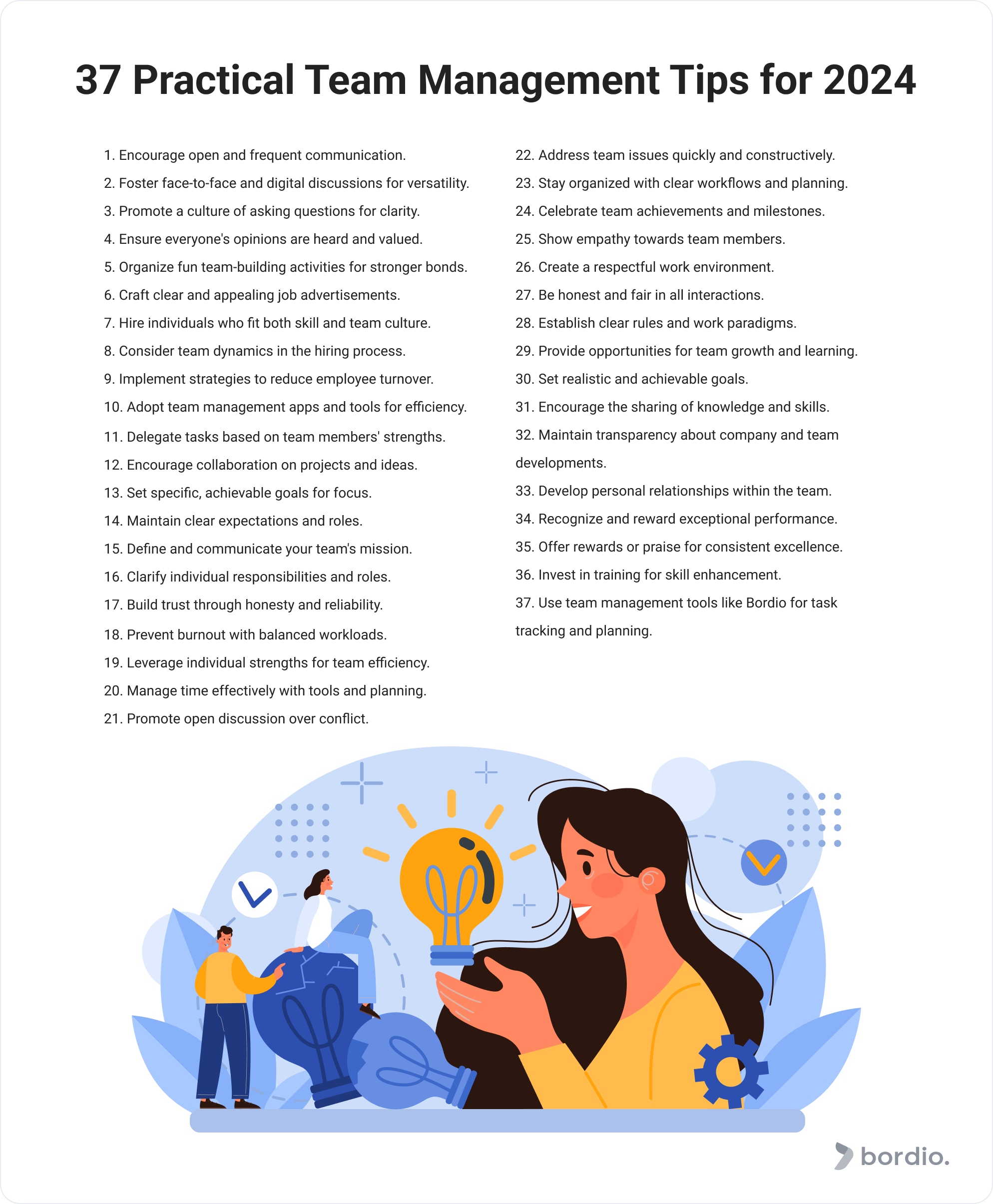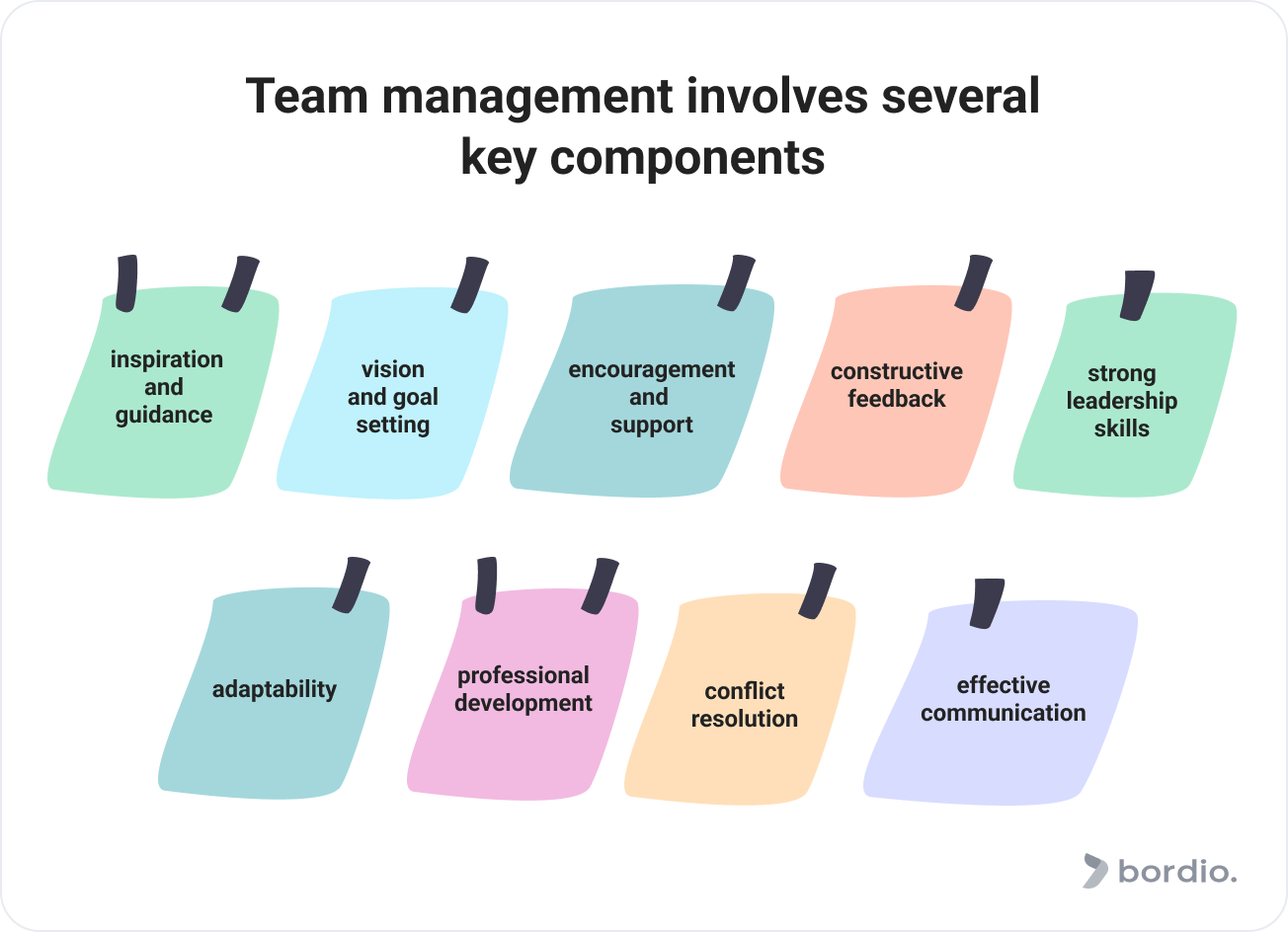Being a leader, staying productive, and having a successful business can be challenging. It’s not just about giving out tasks to complete but also about mastering team management skills. If you’re reading this, you’re probably a leader or a team manager who wants to improve your team management skills. That’s great, and we’re here to help you with that!
What is team management?
Team management is more than just telling people what to do. It’s about inspiring, guiding them toward a shared goal, and motivating the team. The leader isn’t just a boss; they’re the one who brings everyone together and creates an environment for effective team management.
The team manager lays out a clear vision and goals for the team so everyone knows what they’re working toward and why it matters. Team leaders must encourage members to do their best, give constructive feedback, and motivate the team.
Communication is vital for effective team management. The team leader should ensure everyone is on the same page and listen to their ideas and concerns. They also help team members improve their skills and grow professionally by giving constructive feedback and support. When conflicts arise, team leaders resolve them and keep things running smoothly.
Overall, leading a team is about bringing people together to achieve success, and it takes the ability to adapt, inspire, and manage effectively. Basically, how well your team and project can come down to your leadership. That’s why having strong skills is super important. Let’s jump in and check out some handy tips to boost your leadership experience and successfully manage a team.
Team management tips on communication
First and foremost, effective communication is crucial for any team. Successful team management largely depends on how well its members communicate. Therefore, first of all, we want to provide you with tips on communication for effective team management.
1. Keep talking as a team
Good teams talk a lot. It stops problems before they start by letting everyone deal with changes together; keeping in touch helps everyone know what’s going on, share ideas, and feel like they’re working towards the same goal. These can be different forms of communication, but each is equally important.
Apart from face-to-face communication in the office, there can be one-on-one meetings for extensive communication and discussion of ongoing projects and tasks, calls, and messages for shorter urgent discussions. These options are also suitable for remote teams, and it is beneficial to use the team management tools that can help communicate even more effectively; for example, Bordio not only allows users to leave notes and fill the task description but also has a live chat for fast communication. Just click on a task, and you can discuss the task problems or ask some relevant questions. This way, you will spend less time chatting but communicating effectively, and you do not even have to leave the collaboration software.
2. Ask questions
It’s essential to be open and honest. When everyone can speak up without worrying, it builds trust, helps the team work together better, and helps you effectively manage a team. Being open also means we can spot problems and fix them as a team, strengthening us. Don’t be afraid to ask questions! It’s better to ensure we understand things than to make mistakes because we are too shy to ask. Asking questions helps you work smarter and avoid misunderstandings.
3. Listen to each team member
Everyone’s opinion matters. When we make sure everyone gets heard, it makes our team more robust and more diverse. Team communication is not only about communication between members; you also listen and talk to the team. Hearing different ideas helps us make better decisions and keeps things interesting. One specific team member can bring fresh ideas, while someone else can tell you about the problems. It’s all important for the success of a well-managed team and employee satisfaction.
4. Have fun teambuilding
Building friendships with our team members makes work more fun and helps us understand each other better. When we know and support each other, it makes us happier and more productive.
Doing fun activities together helps us relax, bond, and feel motivated. It strengthens our team and makes us feel closer, which is suitable for our work in the long run. Plus, it’s nice to hang out outside of work sometimes!
However, if you go all together as a team to the mountains, camping is a good idea, but if it’s too much for you, you can start with small corporate parties. You can also defuse the situation with some small activities – for example, taking care of plants in the office. Coming up with fresh ideas for team building is also an excellent task to unite the team and help with effective team management!
Team management tips on hiring
Another crucial aspect of effective team management is hiring the right people. Selecting the right employees and forming the team correctly are crucial elements in team management. Equally important is retaining current employees. Here are some tips specifically focused on this aspect:
5. Write a good ad
Writing a good job ad is critical to attracting suitable candidates. Start by clearly explaining the job and what you’re looking for regarding skills and qualifications. Use language that reflects your company’s vibe and values to draw in candidates who will fit in well. Highlight any cool perks or benefits your company offers to make the job more enticing. Keep the ad simple and easy to understand so potential candidates know exactly what you’re looking for. A well-written job ad brings in more applicants and ensures they fit the role correctly.
6. Find the right people
Ensuring you hire the right people is crucial for creating a solid team. This involves finding candidates with the right skills and experience who fit well with your team’s goals and atmosphere. It’s not just about reading resumes; it’s about finding individuals who will blend in smoothly with your team and contribute to its success. You must ask the right questions during the interview and analyze how well a person fits the team. Hiring the right people sets the stage for a team that works together towards shared objectives.
7. Be mindful of the team when selecting employees
When hiring new folks, it’s essential to consider how they’ll fit in with your existing team. This applies to the selection before the interview and the probation period. Be careful at this time. Look for candidates with the right skills, share the same values, and work well with others. Consider how they communicate and solve problems and whether they’ll get along with your current team members. Get input from your team during the hiring process to ensure everyone’s on board with the new hire. By being mindful of your team when hiring, you can create a positive work environment where everyone can thrive.
8. Reduce employee turnover
To keep your best employees and reduce employee turnover, it’s crucial to keep them happy. This involves ensuring your team stays solid and productive. You can do this by recognizing and rewarding their hard work with bonuses or extra perks.
Additionally, invest in their growth and development by providing training or opportunities for advancement. Ensure they feel supported and valued, and create a positive work environment where they can thrive. By showing appreciation to your top performers, you can encourage them to stick around longer, thereby maintaining the strength of your team.
Team management tips on boosting productivity
Productivity is essential in the workplace, just like water is to fish. We all need productive employees, but it’s easy to overdo it and lose an excellent work-life balance. So, how can we enhance productivity for effective team management?
9. Embrace team management apps and tools
Let’s start incorporating technology to make your team’s work easier. Project management tools, apps, and work software can help organize tasks, improve communication, and speed up processes. For instance, you can use project management apps or messaging platforms for fast team communication.
Many apps and tools are made to help teams work together smoothly. They assist with task management, communication, and tracking progress, making it easy for teams to stay connected no matter where they are.
Platforms like Bordio are great for tracking tasks and planning assignments. With Bordio, you can list to-do’s and keep a backlog of tasks for your team. You can quickly schedule time blocks for better planning, assign tasks to team members, and set deadlines. Need to check the calendar and see upcoming events and tasks? Bordio has got you covered there too! By using tools like Bordio, your team can boost team performance and productivity.
10. Delegate tasks effectively
When you have a lot to do, it helps to share the work with your team. But it’s essential to give tasks to the right people. Look at what each person is good at and how much they can handle, then give them tasks that fit. This helps you get more done and helps your team members feel more responsible for their work. It’s like giving everyone a piece of the puzzle they’re good at so the whole picture comes together nicely. To ensure tasks are distributed effectively, follow these steps:
1. Analyze the group’s activities and the abilities of its members to identify the team’s strengths and weaknesses.
2. Ask yourself questions about the task to determine how it should be completed and who best suits it.
3. Once you understand clearly, give the task to the appropriate team member.
11. Encourage team collaboration
Working together as a team can make things go smoother and faster. Create an environment where people feel comfortable sharing ideas and working together on projects. You can have regular meetings or brainstorming sessions where everyone can pitch in. Collaboration helps bring out new ideas and helps everyone feel like they’re part of the team. It’s like having many people working on a project together, which is even better than if one person did it alone.
Team management tips on strategy
Strategy is an integral part of any business’s success. Understanding it, at least for effective team management, is necessary, and the acquired skills will be helpful in other areas. And so a few strategy tips:
12. Stay focused on goals
Make sure everyone in your team is working towards specific, achievable goals. Setting and achieving goals helps us know exactly what we aim for and keeps us on track. It’s like having a roadmap to success that guides us through our work and helps us stay focused on what matters. Define the project’s goal and a particular team’s goal and bring this idea to the members.
13. Be clear about expectations
Let everyone know their roles, what they’re responsible for, and what’s expected from them. When everyone understands what they need to do, it reduces confusion and ensures everyone pulls their weight. It is like a manual for assembling furniture – it is also essential for the final result. Don’t overestimate the team and yourself, and realistically set expectations so that you don’t get frustrated that you couldn’t accomplish in a day what is hard to do in a month.
14. Define your team’s mission
What does your team do, and what do you want to achieve together? In addition to the company’s overall purpose, it is essential to define the purpose of the individual teams. A clear mission gives everyone a sense of direction in which to grow, like sunshine for plants.
15. Know who is responsible
Everyone on the team has a job and a specific role to play. Even during the recruitment and probationary period, you will analyze the employee and give them a specific role. When everyone understands their role, it helps things run smoothly and ensures nothing gets out of hand.
16. Build trust among your team
Build trust by being honest, reliable, and respectful with each other. In difficult times, trust will be necessary for working well together. As a leader, you must also trust your team to avoid putting unnecessary pressure on employees, give them space to express themselves and give them fresh ideas.
17. Avoid burnout
Remember the psychological health of your employees in order to work productively and not miss deadlines. Take steps to prevent team burnout. They do not have to be overwhelmed or exhausted by their workload. Choose the right amount of work for each person.
Use your team’s strengths:
Find out what each team member is good at and use those strengths to our advantage. Leveraging everyone’s strengths helps us work more efficiently and effectively as a team. One participant is good at analysis and extensive reports, while another is better at small tasks. By doing what they do best, they can help you complete projects faster and more efficiently. It’s like putting together a puzzle where each piece fits perfectly to create a bigger picture.
18. Manage time wisely
If you have large tasks, break them down into smaller steps to make them easier to tackle. Tools like calendars or apps will help you track what you must do and when. Try to avoid distractions such as social media or unnecessary meetings that can take up your time. Ensure you use your time and resources wisely to finish things on time. Good time management keeps us on track and helps us meet our goals without feeling rushed or stressed.
19. Encourage discussion, not conflict
Open discussions and debates are needed to explore different points of view in your team and find creative solutions for problems. At the same time, make sure that discussions do not go beyond the scope of business communication and do not develop into conflicts that could interfere with work. Conflict management positively helps us resolve differences and work together better. Brainstorm together to develop the best ideas and solutions without hard feelings!
20. Resolve team issues promptly
But if conflicts do arise, you must address them to prevent them from becoming more significant problems. Addressing problems proactively helps us move forward and prevents them from slowing us down. We advise you to deal with problematic situations immediately because from a drop, the sea is born, and the sooner you find a way to solve the problem, the more control over the situation and respect you will have.
21. Be organized
Stay organized by setting up transparent workflows and planning your work properly. Being organized helps us stay focused, work efficiently, and adapt quickly to change. Keep your documents in order, check your email on time, and track your tasks and to-do’s organized in software.
Bordio is well suited for this kind of work; this software allows you to easily create and organize tasks into different categories and see a calendar with all upcoming events and tasks. With such a convenient tool, you will be organized and can keep track of your project’s stage via your phone or computer.
22. Support your team
Acknowledge and celebrate the team’s accomplishments and important milestones. Celebrating our successes boosts our spirits and encourages us to put in our best effort. For example, after completing an important project, you can celebrate it as a victory. That will create the right atmosphere, increase employee engagement, and boost collaboration.
Team management tips on motivation
Now, let’s take a look at some useful tips to help you keep your team motivated and performing at their highest level.
23. Be empathetic
Show understanding and empathy to your team members. Being empathetic means recognizing their feelings and experiences. It helps build trust and creates a positive atmosphere at work.
24. Create a respectful environment
Build a workplace where everyone treats each other with respect and dignity. This means valuing each person’s opinions and differences. People feel safe sharing ideas and collaborating when there’s mutual respect.
25. Be honest and fair with everyone
Always be truthful and treat everyone with fairness in your communication. Being open and honest helps create trust among the team, making each member feel their work is appreciated and respected. When decisions are made openly and fairly, it boosts the morale and motivation of all team members. They see that their leader values their input and strives to consider everyone’s interests fairly.
26. Use a set of rules as a working Paradigm
Set clear rules and guidelines for your team’s work. This will help everyone understand what is expected of them and help maintain consistency in actions. As a result, the team cooperates, avoiding conflicts and uncertainty, contributing to more efficient and effective work.
27. Give Team Members Room to Grow
Inspire your team to learn new and improve their skills. Providing opportunities for personal development promotes motivation and active participation. When people feel personal growth, they tend to maintain high levels of motivation and enthusiasm for their tasks. You can send them for advanced training yourself or organize seminars and courses – this will be to your advantage.
28. Set Achievable Goals
You must have realistic and achievable goals. Clear goals give people something to strive for and a sense of achievement when they achieve them. Don’t overdo them, and understand your weaknesses. This helps everyone stay focused and motivated to do their best.
29. Take Advantage of Other People’s Knowledge And Skills
Everyone brings something valuable to the table, so encourage collaboration and the sharing of ideas. When people work together, they can solve problems more effectively and develop innovative solutions. So we come back to the advice about good teamwork.
30. Be Transparent
Keep your team informed of what is happening and explain why decisions are made. Transparency builds trust and helps everyone understand their role on the team. When people know what’s happening in the company, they feel more connected and motivated to contribute. There is no need to create a gloomy atmosphere of mystery in your decisions.
31. Develop Relationships
Take the time to get to know your team members personally. Building strong relationships based on trust and respect creates a supportive and cohesive team. When people feel connected, they are more likely to do more for each other.
Recognize and Reward Exceptional Differences:
Make sure to acknowledge and reward your team when it does exceptionally well and achieves big things. Celebrating success lifts everyone’s spirits and drives them to do great things. When people know you value their efforts, they will likely stay involved and dedicated to the team.
32. Give rewards for great work
It’s important to reward or praise consistent, top-notch work. Rewarding someone for doing well encourages them to keep up the good work and aim for even better. It lets them know that you see and value the hard work they’re putting in.
33. Help your team grow
Help your team members improve their work by giving them chances to learn. Putting money into training lets people pick up new skills and keeps them interested in their jobs. When team members feel that you’re backing their growth, they’re more likely to stay excited and dedicated to their work.
Final Thoughts on Team Management Tips.
Good team management skills are key for leaders who want to increase productivity and create a great workplace. Being able to communicate well is at the center of managing a team well. This helps with working together, solving problems, and reaching goals.
Leaders need to listen to the right people and keep their best employees. This helps make a strong team. Leaders should use technology smartly, assign tasks well, and encourage team spirit to accomplish more. Also, having clear goals, building trust, and helping employees grow is essential. These steps make a positive work environment and keep the team motivated.
Using these practical tips, leaders can handle tough situations, motivate their teams, and succeed together.














